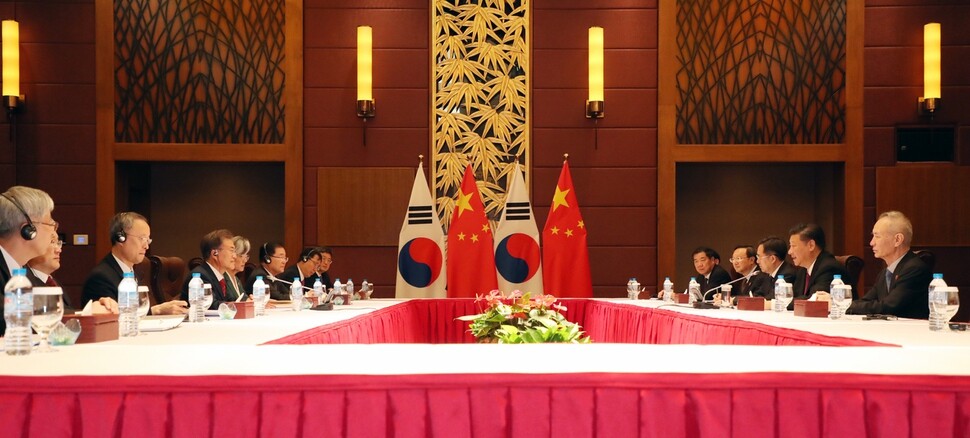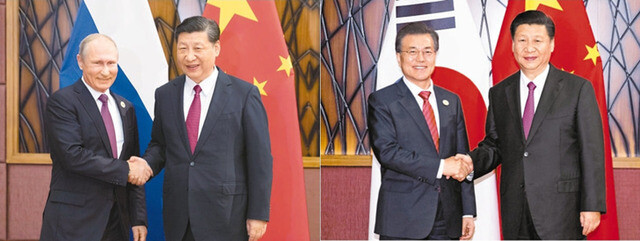hankyoreh
Links to other country sites 다른 나라 사이트 링크
Conflicting interpretations of China’s decision to again raise issue of THAAD deployment

China’s decision to raise the THAAD deployment during the South Korea-China summit puts the spotlight back on an issue assumed to have been settled during deliberations on Oct. 31. Chinese President Xi Jinping mentioned the THAAD issue during his summit with South Korean President Moon Jae-in in Da Nang, Vietnam, on Nov. 11. A statement released by China’s Ministry of Foreign Affairs on Nov. 12 said that Xi had reconfirmed China’s position on deploying THAAD in South Korea during his meeting with Moon the previous day. “Xi said that South Korea-China relations are at a critical point and that the two countries must respect their key interests and their grave concerns, safeguard reciprocal trust in political affairs and strengthen communication and cooperation,” China’s Foreign Ministry reported.
After the summit, the Blue House played up the fact that the two leaders had not disagreed about normalizing cooperation and exchange based on the Oct. 31 deliberations and reported that “Xi described this as a ‘new starting point and a good beginning.’” This has led some to say that South Korea and China are offering different interpretations of remarks by Xi that were quoted in Chinese state-run media such as Xinhua and the People’s Daily.
A senior official at the Blue House held an informal briefing late in the evening to address these questions. “The reports [in the Chinese media] confirm China’s basic position. They do not deviate from the scope of the joint statement on THAAD issued on Oct. 31,” said a senior the official, who was present during the summit. “After confirming that position, President Xi said that it is nevertheless important at the present moment to work on the future-oriented development of the two countries’ relations.” According to this explanation, the only reason Xi brought up the THAAD issue again was to put weight on bringing the issue to a close and normalizing South Korea-China relations.

An alternative interpretation is that China had had enough of South Korea portraying the Oct. 31 deliberations both domestically and internationally as if China had yielded on the THAAD issue and resigned itself to the deployment. According to this view, the comments were a signal from the Chinese government to related Chinese industries and officials - which were coming across translations of a significant number of reports from the South Korean press predicting an easing of tensions after the Oct. 31 deliberations - that there had been no abrupt change in policy. The comments can also be seen as a warning to South Korea not to let THAAD become a problem again.
“On Oct. 31, South Korea and China drew up guidelines of a sort that signify a new point of departure, but this cannot be seen as a complete ‘agreement.’ It’s a makeshift agreement stating that China will decide on its position according to South Korea’s attitude in the future. Since China has not retracted its official position that THAAD damages its strategic interests, the THAAD issue continues to simmer and could still boil over under the right circumstances,” said Lee Hui-ok, director of the Sungkyun Institute of China Studies.
“This is not sealed up,” said Kim Heung-gyu, director of Ajou University's China Policy Institute, in a nod to the South Korea’s government’s choice of expressions. “China will be watching to see how the ‘three no’s’ are actually implemented.” The three no’s are South Korea’s agreement not to deploy additional THAAD batteries, not to participate in the US missile defense network and not to forge a trilateral military alliance with the US and Japan.
“Just as South Korea stands firm on the comfort women issue and continues to deal with it separately even while seeking to repair relations with Japan, this only means China is using a two-track strategy on THAAD. If [the South Korean government] tries to make it look like China acquiesced, the Chinese government will have no choice but to bring up the issue again. President Xi’s reputation is on the line here,” said Kim Jun-hyeong, a professor at Handong Global University.
By Noh Ji-won, staff reporter and Kim Oi-hyun, Beijing correspondent
Please direct questions or comments to [english@hani.co.kr]

Editorial・opinion
![[Column] Park Geun-hye déjà vu in Yoon Suk-yeol [Column] Park Geun-hye déjà vu in Yoon Suk-yeol](https://flexible.img.hani.co.kr/flexible/normal/500/300/imgdb/original/2024/0424/651713945113788.jpg) [Column] Park Geun-hye déjà vu in Yoon Suk-yeol
[Column] Park Geun-hye déjà vu in Yoon Suk-yeol![[Editorial] New weight of N. Korea’s nuclear threats makes dialogue all the more urgent [Editorial] New weight of N. Korea’s nuclear threats makes dialogue all the more urgent](https://flexible.img.hani.co.kr/flexible/normal/500/300/imgdb/original/2024/0424/7317139454662664.jpg) [Editorial] New weight of N. Korea’s nuclear threats makes dialogue all the more urgent
[Editorial] New weight of N. Korea’s nuclear threats makes dialogue all the more urgent- [Guest essay] The real reason Korea’s new right wants to dub Rhee a founding father
- [Column] ‘Choson’: Is it time we start referring to N. Korea in its own terms?
- [Editorial] Japan’s rewriting of history with Korea has gone too far
- [Column] The president’s questionable capacity for dialogue
- [Column] Are chaebol firms just pizza pies for families to divvy up as they please?
- [Column] Has Korea, too, crossed the Rubicon on China?
- [Correspondent’s column] In Japan’s alliance with US, echoes of its past alliances with UK
- [Editorial] Does Yoon think the Korean public is wrong?
Most viewed articles
- 1[Column] Park Geun-hye déjà vu in Yoon Suk-yeol
- 2Thursday to mark start of resignations by senior doctors amid standoff with government
- 3[Editorial] New weight of N. Korea’s nuclear threats makes dialogue all the more urgent
- 4Will NewJeans end up collateral damage in internal feud at K-pop juggernaut Hybe?
- 5Why Korea shouldn’t welcome Japan’s newly beefed up defense cooperation with US
- 6[Guest essay] The real reason Korea’s new right wants to dub Rhee a founding father
- 7Kim Jong-un expressed ‘satisfaction’ with nuclear counterstrike drill directed at South
- 8[Column] ‘Choson’: Is it time we start referring to N. Korea in its own terms?
- 9N. Korean hackers breached 10 defense contractors in South for months, police say
- 10[Column] Yoon’s first 100 days should open our eyes to pitfalls of presidential system